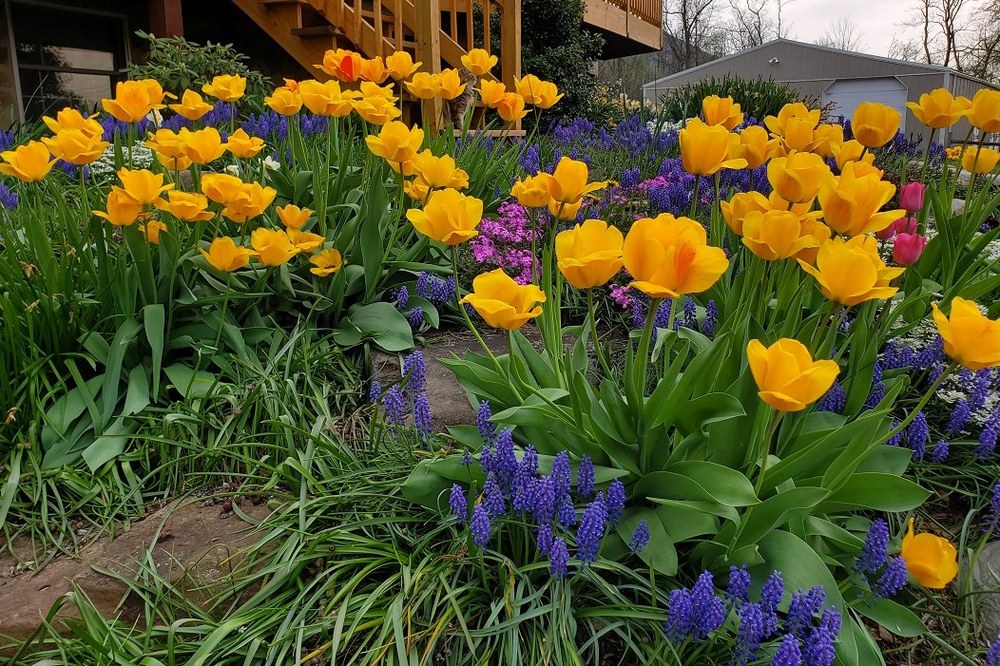Posted: March 29, 2022
Concern about the effects of climate change and other environmental issues has grown in recent years, causing many to wonder what individuals can do. These are very complex problems which require action at many different levels. Below are ten activities gardeners can focus on to make a difference in their own backyards.

Photo credit: Debra Burrows
- Shrink your lawn. Eliminate turf and use the space to plant native trees, shrubs, and perennials that provide food and habitat for threatened pollinators and other wildlife. Change the way you maintain the lawn that remains--leave the clippings on the lawn, raise the mower blade, and limit watering. Leaving the clippings returns organic matter to the soil. Raising the mower blade encourages healthy growth of turfgrass and crowds out weeds.
- Improve your soil. By adding organic matter, you can improve the structure of the soil, add nutrients, and increase the water-holding capacity of the soil, thereby decreasing the need for supplemental watering and fertilizer. Use fallen leaves, yard waste, fruit and vegetable scraps, and other organic matter to make compost and then add it to your soil. Limit rototilling. That recommendation may come as a surprise to some veteran gardeners, but research has shown that tilling can sometimes do more harm than good. It can destroy beneficial organisms in the soil, kills earthworms, and damage soil structure.
- Rethink your concept of "perfect." The traditional idea of "picture-perfect" really isn't perfect at all when it comes to yards and gardens. A manicured, pristine landscape is a very artificial construct that requires considerable resources and labor to maintain. It can be a foodless wasteland for hungry birds, insects, and other wildlife. Lawns with just one type of turfgrass, devoid of clover and weeds, are of little value to the insects and other creatures that make up the web of life. Without them, we would cease to exist. The same is true of our flower and vegetable gardens. All too often, we want to see flawless leaves and petals, undamaged by insects. Yet those very insects pollinate our vegetables and flowers. Applying pesticides to eliminate them, just for the sake of a "perfect" appearance is counterproductive. There are better ways to deal with pests (see Integrated Pest Management, below). By trying to maintain an outdated concept of "perfect" we risk over-fertilizing, over-watering, and over-using pesticides. Making our landscapes a little less pristine will make them a lot more hospitable to wildlife and better for humans and our environment as well.
- Plant native trees, shrubs, and perennials. This doesn't mean giving up all of your cherished non-native plants. Strive to attain a ratio of approximately 70% natives to 30% non-natives. There are plenty of attractive native plant choices, and Master Gardeners can help you find those that are suitable for your landscape. You will be helping birds, butterflies, bees, and other wildlife survive.
- Limit outdoor lighting. It has been linked to insect decline. We're learning that outdoor lighting may negatively affect insect mating, foraging for food, reproduction, and survival. Homeowners can do a lot to fix this problem. Simply turning off outdoor lights when they are not needed is an easy solution. Putting outdoor lights on a timer or motion sensor that will turn them on only when there is movement is another. Choosing outdoor lighting fixtures carefully, making certain that they direct the light only where it is needed, and using bulbs that emit amber light, as opposed to the blue and white light that is especially attractive to insects, will help as well. (See Washington University in St. Louis and Smithsonian Magazine).
- Use Integrated Pest Management (IPM) for controlling pests. Penn State Extension defines IPM as "a decision-making process that seeks the least toxic method for controlling pests." For details visit Integrated Pest Management or contact the Penn State Extension Office in Clinton County at 570-726-0022.
- Fertilize only when absolutely necessary, as indicated by a soil test, and only in the right amounts. Do not over-fertilize!
- Use water wisely. Over-watering is wasteful and can cause weak, unhealthy growth that is susceptible to disease. Over-watering can cause runoff and erosion, removing valuable nutrients and soils and depositing them in streams and rivers where they can do further damage.
- Remove invasive plants. Insects and other wildlife have evolved to live with and feed on native species. When those natives are replaced with invasives, insects lose their sources of food and habitat. Even if you control the growth of invasives in your own landscape, remember that their seeds can be carried far and wide by the wind, birds, etc. They can take root in wild areas and crowd out the native plants that are essential to the survival of insects, birds, and other wildlife, and in the long run, to humans as well. The Pennsylvania Native Plant Society provides a list with details about invasive plants to avoid.
- Limit the installation of impermeable surfaces such as concrete walkways and paved driveways. As an alternative, consider using paving stones or gravel that will allow water to permeate through the surface and seep into the ground. Some readers might remember the Joni Mitchell song that was covered by Sonny and Cher in the early 1970's warning that humans were going to "pave paradise and put up a parking lot." Just look around, I think they were on to something. In our own yards, at least, we can prevent that from happening.
Environmental Stewardship is a high priority for many Master Gardeners. In fact, it's part of our Mission Statement. Master Gardeners in Clinton County are available to help those interested in practicing environmental stewardship by making changes to their gardening and landscaping practices. Contact us through our Garden Hotline at 570-858-0198 or via e-mail at ClintonMG@psu.edu.

